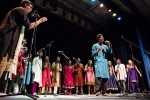The original version of this article contained an error and has been changed. See the bottom of the article for more information.
Small candles surrounded by gold lattice marked the center of each table in the ballroom. As the night began, men and women sat draped in elegantly flowing robes and scarves that shimmered when they caught the light.
The vibrant colors and ornate patterns of South Asian culture filled Ackerman Grand Ballroom at a Diwali and Eid Celebration Friday. Diwali and Eid are two of South Asia’s most important holidays, said Rafay Haseeb, president and founder of Indus, the student organization that planned the event.
About 500 members of the UCLA community celebrated Diwali and Eid with South Asian music, dance and cuisine at Friday’s event. They helped themselves to chicken pakoras and vegetable samosas as they waited for the evening’s entertainment to begin.
Diwali, the festival of lights, is a primarily Hindu holiday, but Sikhs and Jains also celebrate it. Eid, known fully as Eid-al-Adha, is an Islamic holiday. Diwali celebrates the triumph of light over darkness and good over evil, while Eid marks the end of Hajj, the Muslim pilgrimage to Mecca.
Diwali is celebrated with music, dancing, bright colors and lots of lights. Eid is celebrated by saying prayers, singing hymns and donating to the poor. Both involve getting together with loved ones for a feast.
Indus, whose name refers to the Indus river that runs through Pakistan and India, is a cultural organization whose goal is to promote unity among South Asians and educate the UCLA community about South Asian culture.
Haseeb, a third-year political science student, said he considers the celebration significant because of the history of conflict between Hindus and Muslims in South Asia.
“It unites multiple religious groups in South Asia that have historically fought each other. Now we’re celebrating side by side.” Haseeb said.
South Asia is a region that includes countries such as India, Pakistan, Bangladesh, Sri Lanka and Nepal. It is a religiously diverse region that includes Hindus, Muslims, Sikhs, Jains and Buddhists, among others.
Sunveer Sangha, a first-year psychobiology student, visited the henna booth at the event. Her hand had been painted with elaborate swirls and spirals. Henna, a style of temporary tattooing, is commonly applied at South Asian holiday celebrations.
“There’s a strong sense of community here,” Sangha said. “It’s really beautiful.”
Representatives from three charitable organizations – Islamic Relief, Project Rural India Social and Health Improvement, and the Bhagat Puran Singh Health Initiative – attended the event to collect donations.
Charity is an important part of these holidays, and inviting these organizations continues that tradition, Haseeb said.
Zoya Chhabra, director of operations and marketing for Indus, was born and raised in India, but her grandfather is from Pakistan. She said she’s always trying to connect her Indian and Pakistani identities.
Chhabra, a second-year astrophysics student, said she’s culturally Hindu, but not religious. She said she celebrates Diwali as an opportunity to reconnect with family and friends.
As the lights in the ballroom dimmed, everyone took their seats to watch four dance groups and an a cappella team perform.
The a capella team took to the stage first. Its sound started off soft and melodic, then grew more rhythmic. Several vocalists took turns singing in both Hindi and English.
Dance teams included the traditionally inspired Taara, UCLA’s newest South Asian dance team, Bollywood-style Nashaa, Raas team Bataaka Nu Shaak, and Bruin Bhangra, which won first place at a national Bhangra competition last year.
Third-year psychobiology student Munny Badesha, a member of Bruin Bhangra who performed at last year’s event as well, said this year’s celebration had a much higher turnout.
“The turnout this year was fantastic,” Haseeb said. “We are definitely bridging gaps and coming together as a community, and I think that’s the most important thing.”
Correction: Chhabra’s grandfather is from Pakistan.
